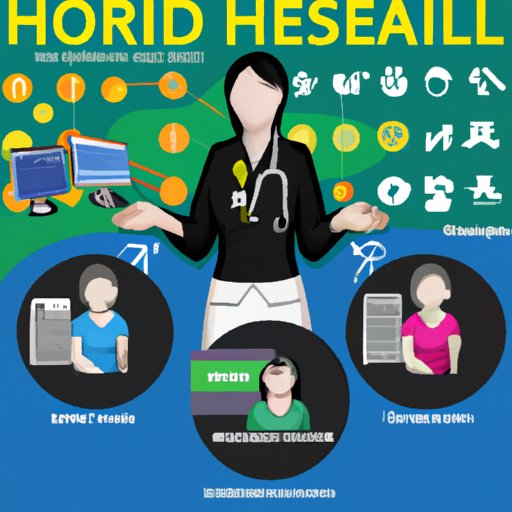Introduction
A degree in health science is a great way to pursue a rewarding career that focuses on helping people. These degrees offer a wide range of educational opportunities and provide graduates with the skills and knowledge needed to enter into a variety of healthcare professions. With a degree in health science, you can become a health educator, community health worker, health care administrator, public health practitioner, health informatics specialist, medical services manager, or clinical research coordinator, among other professions.
Become a Health Educator
A health educator is someone who works to promote healthy living and prevent illness by educating individuals and communities about health-related topics. They often work in hospitals, clinics, schools, government agencies, and other organizations. To become a health educator, you typically need a bachelor’s degree in health science, public health, or a related field. In addition, most employers require health educators to be certified through the National Commission for Health Education Credentialing (NCHEC).
One of the primary benefits of being a health educator is having the opportunity to make a positive impact on the health of individuals and communities. According to the Centers for Disease Control and Prevention (CDC), “Health education helps people gain the information, skills, and motivation to make healthier choices.” Additionally, health educators often have the satisfaction of knowing that their work is helping to improve the health of people around them.
Work as a Community Health Worker
Community health workers are healthcare professionals who work with individuals and families in their local communities to promote health and wellness. They often provide health education, as well as services such as screening and referral for medical care. To become a community health worker, you typically need a high school diploma or equivalent, as well as certification from an accredited program. Some states also require community health workers to obtain licensure.
The primary benefit of working as a community health worker is having the opportunity to make a difference in the lives of individuals and families in your local community. According to the CDC, “Community health workers are uniquely positioned to bridge gaps between health care providers and the communities they serve.” Additionally, community health workers have the satisfaction of knowing that their work is helping to improve the health and wellbeing of people in their local area.
Become a Health Care Administrator
A health care administrator is someone who is responsible for overseeing the day-to-day operations of a medical facility or organization. They often manage personnel, budgeting, patient care, and other administrative duties. To become a health care administrator, you typically need a bachelor’s degree in health administration, public health, or a related field. Additionally, many employers require health care administrators to have a master’s degree and/or certification in a specialty area.
The primary benefit of being a health care administrator is having the opportunity to shape the future of healthcare. According to the American College of Healthcare Executives, “Health care administrators play a critical role in the delivery of quality health care.” Additionally, health care administrators often have the satisfaction of knowing that their work is helping to improve the efficiency and effectiveness of healthcare organizations.

Work in the Field of Public Health
Public health is a broad field that focuses on improving the health and wellbeing of populations, rather than individuals. Public health practitioners work to identify and address the health needs of communities, as well as develop policies, programs, and interventions to improve health outcomes. To work in the field of public health, you typically need a bachelor’s degree in public health or a related field. Additionally, many employers require public health practitioners to have a master’s degree in public health or a related field.
The primary benefit of working in the field of public health is having the opportunity to make a lasting impact on the health of populations. According to the World Health Organization (WHO), “Public health is concerned with protecting and improving the health of populations through education, promotion of healthy lifestyles, and research for disease and injury prevention.” Additionally, public health practitioners often have the satisfaction of knowing that their work is helping to improve the health and wellbeing of entire populations.

Pursue a Career in Health Informatics
Health informatics is the intersection of information technology and healthcare. Health informatics professionals use technology to collect and analyze data to improve patient care, reduce costs, and increase efficiency. To pursue a career in health informatics, you typically need a bachelor’s degree in health informatics or a related field. Additionally, many employers require health informatics professionals to have a master’s degree in health informatics or a related field.
The primary benefit of pursuing a career in health informatics is having the opportunity to use technology to improve healthcare. According to the American Medical Informatics Association (AMIA), “Health informatics combines computer science, information science, and health care to improve the safety, quality, and cost-effectiveness of health care.” Additionally, health informatics professionals often have the satisfaction of knowing that their work is helping to improve the quality of healthcare.

Become a Medical or Health Services Manager
Medical and health services managers are responsible for planning, directing, and coordinating the activities of a medical facility or organization. They often manage personnel, budgeting, patient care, and other administrative duties. To become a medical or health services manager, you typically need a bachelor’s degree in health administration, public health, or a related field. Additionally, many employers require medical or health services managers to have a master’s degree and/or certification in a specialty area.
The primary benefit of being a medical or health services manager is having the opportunity to shape the future of healthcare. According to the Bureau of Labor Statistics, “Medical and health services managers are responsible for ensuring that health care organizations run efficiently and effectively.” Additionally, medical and health services managers often have the satisfaction of knowing that their work is helping to improve the efficiency and effectiveness of healthcare organizations.
Work as a Clinical Research Coordinator
Clinical research coordinators are responsible for managing and conducting clinical trials and research studies. They often work in hospitals, universities, and other research settings. To work as a clinical research coordinator, you typically need a bachelor’s degree in health science, public health, or a related field. Additionally, some employers require clinical research coordinators to have a master’s degree and/or certification in a specialty area.
The primary benefit of working as a clinical research coordinator is having the opportunity to make a difference in the lives of patients and communities. According to the Association of Clinical Research Professionals (ACRP), “Clinical research coordinators play a vital role in advancing medical discoveries and treatments.” Additionally, clinical research coordinators often have the satisfaction of knowing that their work is helping to improve the health of people around them.
Conclusion
A degree in health science provides graduates with the skills and knowledge needed to pursue a variety of rewarding careers. With a degree in health science, you can become a health educator, community health worker, health care administrator, public health practitioner, health informatics specialist, medical services manager, or clinical research coordinator, among other professions. Each of these careers offers its own unique set of benefits and rewards, making it an excellent choice for those looking to make a difference in the health and wellbeing of individuals and communities.
(Note: Is this article not meeting your expectations? Do you have knowledge or insights to share? Unlock new opportunities and expand your reach by joining our authors team. Click Registration to join us and share your expertise with our readers.)
